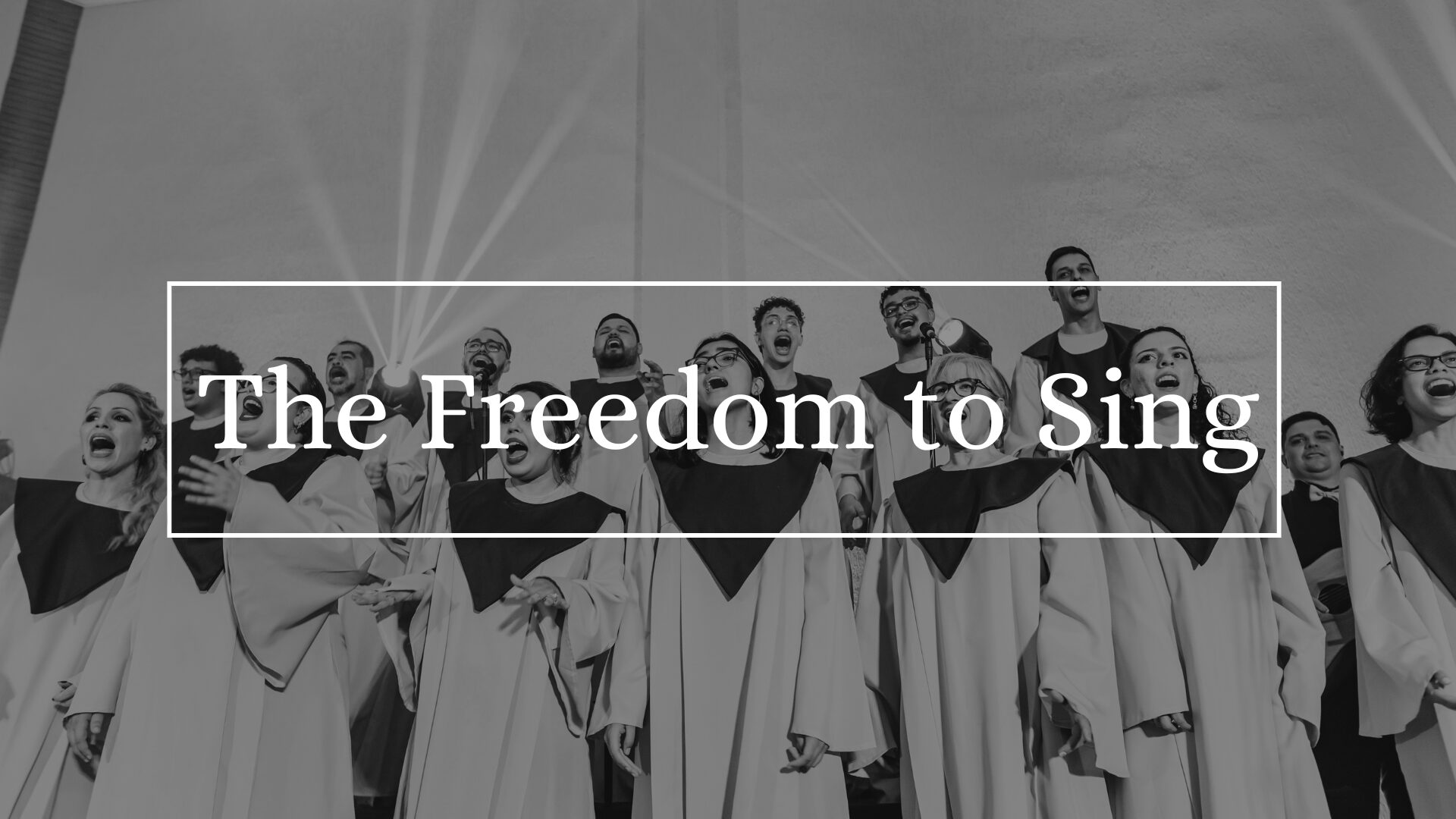Since we are talking about the Freedom to Sing, I had heard some of Dot Lippart’s story, and she is here to today to share a little bit about a story from her life.
Pastor Kathryn had asked me to share a bit about my story, these memories came back to me as I was attending a Flute Day at Millersville University with 70 other flute players. One young man, who graduated from there, was working on a piece called Poem by Griffey’s. That brought back memories of my 9-year-old self.
My mother, who was an amazing musician, was always been my main mentor in my life. She was a church organist and a marvelous pianist, and I heard music all the time. I started taking piano lessons when I was probably seven, and I always enjoyed hearing music.
But when I was 9, she took me to a concert. It was a community concert on Cape Cod in Massachusetts, and this man played the flute. He stood up, and I had no idea who he was, and he said he had one of three platinum flutes in the world. He said he was going to play Poem by Griffey’s, and he started playing that piece. Then, my 9-year-old self said, “That’s what I want to do. I want to play the flute.” I knew that from that moment. It was a spark that this gentleman had no idea that he had set off.
Here I am, many years later, still playing the flute. I’ve taught music and shared music. I’ve moved a lot in my life, but everywhere I have gone, I have made friends in the musical world. Music has been a joy in my life. Sometimes it takes work and is difficult, but I have always loved playing the flute.
When I heard that story, I thought that moment, that concert, gave Dot the Freedom to Sing.
She happens to sing for a flute. But we all have that within us. We all have different ways in which God has gifted us, and maybe it is the challenge of our lives to figure out how we are to sing in this life.
This doesn’t necessarily mean you’re in the choir, but we can sing in so many different ways within our lives. So, I want you to think about how do you bring more beauty and love into this world?
Playing the Flute is how Dot does it. That is how she is more herself, the one God intended her to be through her music, through her flute.
Our tradition is to always read the gospel last, but today I think I should have flipped them because they’re out of chronological order.
The gospel story, John 20:19-31, would’ve taken place first, and then the story from Acts 5:27-32.
After the crucifixion and death, the disciples are scared, right? They don’t know what to do. This story begins on that first Easter day. It is now evening, and the disciples are locked in a room, and they are afraid of the authorities, and Jesus comes to them. But, he doesn’t come to shame them because they deserted him. He comes and offers them peace. He says, peace be with you. And he breathes on them. That is meant to remind us of the Genesis story where God breathed life into humanity. Jesus breathed on the disciples to bring them back to life. To say, don’t keep yourselves locked up in this room, afraid. You are here to live, to enjoy this life, to love, and to share that with everyone. That is such a gift. He was inviting them back into life.

I don’t usually read the part about Thomas, but I read it today because I think that the church has done Thomas a disservice. It says Thomas is also known as the twin. We don’t remember that. He was the twin. We remember that he is doubting Thomas. That’s what we’ve named him. We have renamed him, Doubting Thomas. And don’t be a doubting Thomas. We weaponized it and, we put shame if you doubt. But the reality is that doubt is part of faith. If it were complete certainty, it wouldn’t be faith, it would be what we know.
One of the most freeing sermons I ever heard was that faith is 51% certainty and 49% doubt. You’ve just tipped it towards, I’m more certain today, and that needle moves depending on the day and depending on the moment, right? Depending on what’s going on in life, whether we think God’s listening to us or we feel like our prayers fall on deaf ears, that needle moves, and we can just be honest about that.
But God wants us, and Jesus wants us to build this beloved community that he started to build.
But the writer of this gospel, whether it was John or someone else, put in this verse, too. “Blessed are those who have not seen and yet come to believe” – John 20:29, and I think that verse was there because John’s gospel was written so much later than everything else. He was already writing for people who had not seen Jesus, they could only believe through the stories of others.
It was meant to be an encouragement, but the church has weaponized that, too. If you don’t believe, then obviously we are going to shame you. That’s not the idea. That doesn’t help anyone live more fully into their faith and who God intends for them to be.
I know guilt is powerful, but we need to teach people to love and to be joyful, compassionate, and empathetic. Because the more I question and the more of my doubts there are, the more it helps me and leads me to more belief.
So we went to Acts 5:27-32. This is a story from the very beginning.
I thought I’d lay out Acts for us so we understand where we are. We had the sightings of the resurrected Jesus in Chapter One. The Book of Acts is meant to be a continuation of Luke’s gospel. It was written by the same person, and so it begins with the ascension of Jesus. They watch Jesus Ascend.
Chapter Two is Pentecost. That’s coming up on June 8th. We’ll celebrate Pentecost and the gift of the Holy Spirit. By Chapter Three, Peter starts his ministry in the community, and he begins by healing. That’s what’s getting people’s attention because he can bring healing to people, and by Chapter Four, the religious authorities are onto them again, and they arrest Peter and John. They question them, but they release them. They don’t have anything that they can charge them with.
Chapter Five begins with a story of Ananias and Sapphira, where they try to withhold some things. The community’s been kept holding everything in common living communally, and Ananias and Sapphira decide not to, and it doesn’t work out well for them. Then the apostles start healing again. So the religious leaders get jealous again, and they jail Peter and John a second time. This time, while they’re in jail, an angel comes and releases them.

That’s when Peter had this scripture that we read today. It’s their testament to the other people. When I look at this and I think about what the disciples and those now called apostles. What the apostles lived through, how they continued, they had reasons to be afraid, but they were so strong in their belief that they continued to preach Christ.
They continued to learn and trust in God. And now God empowered them with gifts that no one else had, especially this ability to heal people. They healed a crippled man, and that was one of the things that got Peter and John in trouble at first. But even in this text, Peter answers, we must obey God rather than any human authority.
I lift that because I’m concerned about that verse right now. I’m concerned because there are people who are saying that we need to just follow God’s authority.
It seems like something that we would say absolutely, God is the ultimate authority, except that they want to go back to following all the Levitical laws. Except I don’t think they really mean all Levitical laws. They want to choose which laws we follow.
They wanna say these are important and these are not, because the laws about whether you mix cotton and synthetic. Well, does anybody care if you wear a cotton top in synthetic pants? Or whether you have macaroni and cheese with meat? You can’t put milk and meat together. Those are not the laws they wanted, and they don’t want to lift the laws about leaving the edge of your field unharvested, so those who are poor and the stranger or the alien among you can eat and survive. Those aren’t the verses they wanna lift up.
They have a very definite agenda that I think we need to be paying attention to right now, but later after Acts 5:27-32, there are two more verses that I think are critical. They’re verses 38 and 39. It says “A Pharisee in the council named Galil said to the other leaders, ‘so in the present case, I tell you, keep away from these men and let them alone. Because if this plan or this undertaking is of human origin, it will fail; but if it is of God, you will not be able to overthrow them – in that case you may even be found fighting against God.” – Acts 5:38-39.
That’s what we need to be watching. We need to pay attention. What is God behind, and which of the different voices is God really behind?
The Easter season is about freedom. On Easter, we celebrate that Jesus was free of the tomb, and that we are free from the shame of our faults and our failings.
We are forgiven, loved, and free. Jesus wants us to feel loved and forgiven in our deepest being. That is where our strength will come from. And because hurt people, hurt others. Jesus doesn’t want us to be the hurt people. He wants us to be the loving, empathetic people who look out for the wellbeing of others.
And when we see the well-being of others being hurt, ignored, or blatantly dismissed, then we use our voices. We lift our voices in protest.

Last Saturday, the day before Easter, LIFT UCC and First Reformed UCC downtown held this pop-up choir in Bins Park to sing for justice and declared that immigrants and the LGBTQ+ community are welcome in our midst. I took this picture as I parked at the parking garage.
At that event, there was a Middle Eastern woman who was standing beside me and the whole time we were there, she had tears streaming down her face. They frequently told us to look, turn to your neighbor, and say, “You are loved and you belong here.” We even did a whole chant with “You are fearfully and wonderfully made.”
That’s the message that we are to share. This is Jesus’ love in action during these challenging times.



